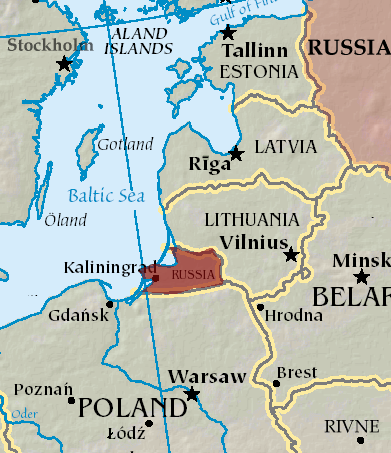As you may have heard, Lithuania has cut off much of the land supply to Kalingrad, a former German city held by Russia, but which has no land connection to Russia.

Lithuania has applied EU sanctions to the transit of goods to Kaliningrad. Russia says this is a blockade and in violation of an agreement from 2002 to allow transit between the Russian mainland and Kaliningrad. Sanctions apparently amount to about 50 percent of shipments, and Lithuania has also closed its airspace to Russia. Because the Baltic freezes during the winter, resupplying Kaliningrad will become particularly difficult in a few months.
The Russian official response has been fairly measured — they consider it a violation and are studying how to retaliate.
The simplest retaliations are not easy; while the EU as a whole relies in Russian energy, Lithuania itself is relatively energy self-sufficient.
I would suggest that the solution, as Lithuania says it is just implementing EU sanctions, is to simply shut off energy to the EU as a whole for a while and see what happens.
But there’s something else here that needs comment: Lithuania is part of NATO.
I believed, when Lithuania joined NATO, that it shouldn’t have been let in. Lithuania has an army of about 20K. It’s not Ukraine, with Europe’s largest army (and still losing), it could be overrun in days. Lithuania feels free to provoke Russia because of NATO Article 5.
But let’s look at exactly what Article 5 says:
The Parties agree that an armed attack against one or more of them . . . shall be considered an attack against them all and consequently they agree that, if such an armed attack occurs, each of them, in exercise of the right of individual or collective self-defence recognised by Article 51 of the Charter of the United Nations, will assist the Party or Parties so attacked by taking . . . such action as it deems necessary, including the use of armed force, to restore and maintain the security of the North Atlantic area.
You’ll notice that this isn’t actually an automatic declaration of war. Each country in NATO will decide what to do.
As I’ve said in the past, if Russia attacks Lithuania, I feel we should go to war.
But the analogy right now is that someone who is too weak to fight is poking someone dangerous because they have friends who can fight.
Are we really willing to risk WWIII and nuclear armageddon so that Lithuania or the EU can provoke Russia?
Lithuanian politicians seem to think that Article 5 is automatic: It isn’t, and they need to remember that. The same is true of the EU as a whole, whose military cannot defeat Russia without aid from the US and Turkey.
How sure are they that the US will answer the call?
Should the US answer the call? Are you personally willing to die so that Lithuania and the EU can poke Russia? (A Russian ex-general recently noted that, if war breaks out, the UK will cease to exist, so this question isn’t really just for Americans.)
I suggest that EU and Lithuanian politicians and citizens should think this over carefully. Turkey, I virtually guarantee, will not join such a war, and those who depend on the US have often found out that it cannot be trusted when the stakes are high.
I doubt this situation will lead to war, but each provocation and escalation, from either side, increases the odds, and we’re playing a very high stakes game here — given how many nuclear weapons both sides have.
Perhaps we should think carefully about for whom we are actually willing to die, about who we’re willing to defend if the cost is that almost everyone we know, including our family and friends, stands a good chance of dying.
Because if WWIII happens, whichever side starts losing, will use nuclear weapons.
You can’t automatically bow down to threats and never be willing to fight, or those who are willing to use violence can make you do anything they want, but there’s a difference between standing up for yourself and provoking a fight.
The EU, NATO and the Baltic states need to think very carefully about this difference.
